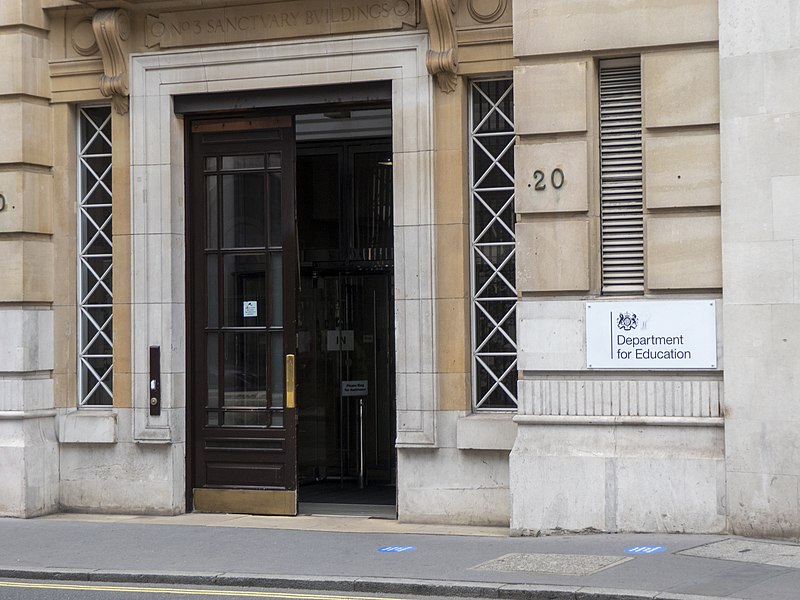Media
-
 Axel Springer backs Dovid Efune’s £500m Telegraph Bid, taking on Daily Mail owner DMGT
German media giant Axel Springer has thrown its weight behind a rival bid for Britain’s Telegraph Media Group, backing a £500 million offer led by U.S. publisher21 February 2026Read More...
Axel Springer backs Dovid Efune’s £500m Telegraph Bid, taking on Daily Mail owner DMGT
German media giant Axel Springer has thrown its weight behind a rival bid for Britain’s Telegraph Media Group, backing a £500 million offer led by U.S. publisher21 February 2026Read More... -
 UK leads global fight against deepfakes with science-driven detection standards
Deepfakes—AI-generated videos, images and audio—are no longer a fringe curiosity. They are a fast-growing threat across the UK, exploited by criminals to scam victims out of money,19 February 2026Read More...
UK leads global fight against deepfakes with science-driven detection standards
Deepfakes—AI-generated videos, images and audio—are no longer a fringe curiosity. They are a fast-growing threat across the UK, exploited by criminals to scam victims out of money,19 February 2026Read More... -
 Former Daily Mail editor Paul Dacre tells UK court he is “angry and upset” over Prince Harry privacy claims
Paul Dacre, the long-serving former editor of the Daily Mail and one of the most influential figures in British journalism, told the High Court in London that he felt11 February 2026Read More...
Former Daily Mail editor Paul Dacre tells UK court he is “angry and upset” over Prince Harry privacy claims
Paul Dacre, the long-serving former editor of the Daily Mail and one of the most influential figures in British journalism, told the High Court in London that he felt11 February 2026Read More... -
 BBC TV licence fee to rise to £180 from April, sparking anger as costs overtake streaming rivals
The annual TV licence fee will rise by £5.50 to £180 from April 1, dealing another blow to household budgets already stretched by the cost-of-living crisis.06 February 2026Read More...
BBC TV licence fee to rise to £180 from April, sparking anger as costs overtake streaming rivals
The annual TV licence fee will rise by £5.50 to £180 from April 1, dealing another blow to household budgets already stretched by the cost-of-living crisis.06 February 2026Read More... -
 Elton John’s husband David Furnish accuses Daily Mail of homophobia and privacy violations in High Court trial
David Furnish, the husband of British music icon Elton John, has accused the publisher of the Daily Mail of unlawfully obtaining private information about their06 February 2026Read More...
Elton John’s husband David Furnish accuses Daily Mail of homophobia and privacy violations in High Court trial
David Furnish, the husband of British music icon Elton John, has accused the publisher of the Daily Mail of unlawfully obtaining private information about their06 February 2026Read More...

Culture
-
 Emery Walker revealed: new exhibition explores the man behind the arts and crafts legend
A new exhibition opening this spring at Emery Walker’s House sets out to restore depth, warmth, and personality to one of Britain’s most influential yetRead More...
Emery Walker revealed: new exhibition explores the man behind the arts and crafts legend
A new exhibition opening this spring at Emery Walker’s House sets out to restore depth, warmth, and personality to one of Britain’s most influential yetRead More... -
 London confirms St Patrick’s Day 2026 parade and Trafalgar Square festival
London will turn green once again next spring after the Mayor confirmed the capital’s St Patrick’s Day celebrations will take place on Sunday 15 March 2026, with aRead More...
London confirms St Patrick’s Day 2026 parade and Trafalgar Square festival
London will turn green once again next spring after the Mayor confirmed the capital’s St Patrick’s Day celebrations will take place on Sunday 15 March 2026, with aRead More... -
 Masterpieces beyond the Museum: National Gallery brings life-size art to communities ccross the UK
World-famous paintings from the National Gallery are stepping out of Trafalgar Square and into everyday life, as part of a major touring project that will seeRead More...
Masterpieces beyond the Museum: National Gallery brings life-size art to communities ccross the UK
World-famous paintings from the National Gallery are stepping out of Trafalgar Square and into everyday life, as part of a major touring project that will seeRead More... -
 Award-winning Polish writer Mariusz Szczygieł brings ‘Not There’ essay collection on UK tour
Polish writer Mariusz Szczygieł, one of Central Europe’s most acclaimed literary reporters, will tour the UK later this month with a series of public events marking the English-language release...Read More...
Award-winning Polish writer Mariusz Szczygieł brings ‘Not There’ essay collection on UK tour
Polish writer Mariusz Szczygieł, one of Central Europe’s most acclaimed literary reporters, will tour the UK later this month with a series of public events marking the English-language release...Read More... -
 Professor Dame Carol Black GBE reappointed as Chair of the British Library for 2026–2027
The UK Secretary of State has confirmed the extension of Professor Dame Carol Black GBE as Chair of the British Library, continuing her leadership from 1 September 2026 to 31 August 2027.Read More...
Professor Dame Carol Black GBE reappointed as Chair of the British Library for 2026–2027
The UK Secretary of State has confirmed the extension of Professor Dame Carol Black GBE as Chair of the British Library, continuing her leadership from 1 September 2026 to 31 August 2027.Read More... -
 Climate, community and care: Soma Surovi Jannat’s landmark exhibition at the Ashmolean Museum
From spring through autumn 2026, the Ashmolean Museum presents 'Soma Surovi Jannat: Climate Culture Care', a powerful new exhibition that places climateRead More...
Climate, community and care: Soma Surovi Jannat’s landmark exhibition at the Ashmolean Museum
From spring through autumn 2026, the Ashmolean Museum presents 'Soma Surovi Jannat: Climate Culture Care', a powerful new exhibition that places climateRead More... -
 Londoners on trial: 700 years of crime revealed in a free City archives exhibition
From medieval pickpockets to notorious Victorian figures, seven centuries of crime, punishment and public fascination are laid bare in a new exhibition atRead More...
Londoners on trial: 700 years of crime revealed in a free City archives exhibition
From medieval pickpockets to notorious Victorian figures, seven centuries of crime, punishment and public fascination are laid bare in a new exhibition atRead More... -
 Lost for centuries, Henry VIII’s golden love pendant finds a home at the British Museum
A golden heart pendant once symbolizing the doomed marriage of Henry VIII and Katherine of Aragon has finally been secured for permanent display at the BritishRead More...
Lost for centuries, Henry VIII’s golden love pendant finds a home at the British Museum
A golden heart pendant once symbolizing the doomed marriage of Henry VIII and Katherine of Aragon has finally been secured for permanent display at the BritishRead More... -
 British High Commission hosts Caledonian Ball in Lahore to celebrate growing Scotland–Pakistan partnership
The British High Commission brought a touch of Scotland to Lahore this week as it hosted the Caledonian Ball at the historic Sir Ganga Ram Residence, celebratingRead More...
British High Commission hosts Caledonian Ball in Lahore to celebrate growing Scotland–Pakistan partnership
The British High Commission brought a touch of Scotland to Lahore this week as it hosted the Caledonian Ball at the historic Sir Ganga Ram Residence, celebratingRead More... -
 300-year-old Rysbrack Marble putti blocked from export as UK scrambles to save national treasure
A three-century-old marble sculpture by renowned eighteenth-century sculptor Michael Rysbrack has been placed under a temporary UK export ban, giving BritishRead More...
300-year-old Rysbrack Marble putti blocked from export as UK scrambles to save national treasure
A three-century-old marble sculpture by renowned eighteenth-century sculptor Michael Rysbrack has been placed under a temporary UK export ban, giving BritishRead More... -
 Inside ICG PR: how an international PR agency shapes reputation for luxury, fashion, and cultural brands
Interview: the co-founder of Iris Consulting Group Iryna Kotlyarevska on building global visibility with cultural intelligenceRead More...
Inside ICG PR: how an international PR agency shapes reputation for luxury, fashion, and cultural brands
Interview: the co-founder of Iris Consulting Group Iryna Kotlyarevska on building global visibility with cultural intelligenceRead More... -
 London Zoo’s giraffes take centre stage in New London Underground poster celebrating 200 years of ZSL
London Zoo’s iconic giraffes have stepped into the spotlight with the launch of a striking new London Underground poster, marking the start of ZSL’s 200th anniversaryRead More...
London Zoo’s giraffes take centre stage in New London Underground poster celebrating 200 years of ZSL
London Zoo’s iconic giraffes have stepped into the spotlight with the launch of a striking new London Underground poster, marking the start of ZSL’s 200th anniversaryRead More...

British Queen celebrates
Most Read
- Teen held after US woman killed in London stabbings
- Heave-ho Harry! Prince prepares to join the walking wounded in ice trek to North Pole
- Football: Farhad Moshiri adamant Everton deal above board
- "Master of English Style". Interview with Designer Lydia Dart
- Letter to the Financial Times from Lord Mayor Alderman Michael Bear
Education

Plans by Christ Church, an Oxford college, to move a 300-year-old boundary stone have faced objections from Historic England. The proposal aims to facilitate the construction of 1,450 new

Alumni UK is a global platform available to all graduates of UK universities, helping to facilitate networking and discussions with likeminded alumni.

New analysis suggests that grade inflation at English universities has seen a decline for the first time in ten years. Across 144 institutions, the percentage of students awarded a first-class

The Secretary of State for Education, Gillian Keegan, has announced that she is recommending Sir Martyn Oliver for the post of His Majesty’s Chief Inspector of Education, Children’s Services

More girls are set to benefit as the Government publishes a two-year plan to improve equal access and the quality of PE and sport in schools for all pupils. The School Sport and Activity Action

Hundreds of Ukrainian Jewish refugee children residing in Poland are being provided with informal educational programs this summer to strengthen their connection to their Jewish identity.

Students and taxpayers will be better protected against rip-off degree courses that have high drop-out rates, don’t lead to good jobs and leave young people with poor pay and high debts, the

After 38 years of serving the Arab and Muslim communities in London, the King Fahad Academy (KFA) has closed its gates. The school, which opened in 1985, was established to provide a safe

According to a study conducted at the University of Sydney, taking short five-minute "brain breaks" can significantly enhance performance and productivity in subsequent tasks. The experiment

Speculation has been swirling around the potential education of Prince George, with Eton College emerging as a likely choice. The nine-year-old was recently spotted visiting the renowned




















